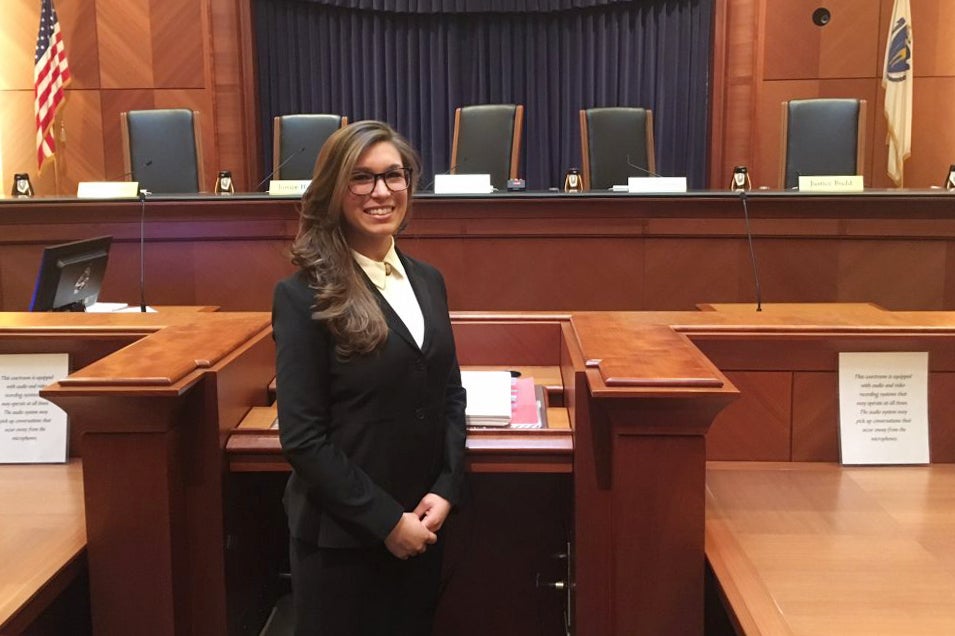In May, Massachusetts’ highest court extended the American with Disabilities Act to mentally and physically disabled prisoners seeking parole, ruling that the state must help them get support systems in place in the community. The Harvard Prison Legal Assistance Project filed the lawsuit, Crowell v. Massachusetts Parole Board, and Tabitha Cohen ’18 argued the appeal.
The suit was originally brought in state Superior Court but was dismissed on the motion of the defendant, the state Parole Board. PLAP’s Mike Horrell ’14 represented the plaintiff in the 2012 parole hearing that led to PLAP’s later lawsuit. Tucker DeVoe ’15 briefed and argued the case in the Superior Court. Erin DeGrand ’16 worked on PLAP’s appeal to the state Appeals Court, including coordinating the drafting of the appellate and reply briefs with Keke Wu ’18, Beini Chen ’18, and Ethan Stevenson ’17.
The plaintiff, PLAP client Richard Crowell, is a septuagenarian prisoner who, in 1987, suffered a disabling traumatic brain injury. He was originally arrested in 1962 as a teenager for a convenience store robbery in East Boston. He was recruited by several older men to drive a getaway car. During the robbery, one of the older co-defendants shot and killed the storekeeper and as a result, Crowell and his co-defendants were charged with first degree murder under the felony murder theory of culpability. To avoid the death penalty, Crowell pled guilty to second degree murder and received a life sentence. In 1974, his sentence was commuted from life to 36 years to life. He was then paroled and spent several years successfully living in the community, with the exception of some minor parole violations that were not serious enough to prevent re-parole. However, after he was attacked and suffered his brain injury in 1987, his behavior worsened and he returned to prison. Since 1990, he has been repeatedly denied parole.
PLAP’s Mike Horrell ’14 represented the plaintiff in his 2012 parole hearing. During that hearing the Board strongly suggested it considered the plaintiff impossible to parole because of his disability, a decision which would effectively consign Crowell to prison for the remainder of his life. After the client was again denied parole, Horrell helped to draft a complaint filed in the Superior Court seeking to reverse the Board’s decision and obtain a new hearing for Crowell. The central claim in PLAP’s complaint was that the Parole Board had discriminated against the plaintiff because of his disability. In addition, PLAP argued the plaintiff was entitled to annual parole reviews, rather than reviews every five years as contended by the Parole Board.
After the briefing was concluded in the Appeals Court but before the case was scheduled for oral argument, the SJC took the case for direct review and solicited amicus briefing on the disability rights issue raised by PLAP. In response, civil rights and advocacy rights groups including the Massachusetts chapter of the ACLU, Massachusetts Prisoners’ Legal Services, the Center for Public Representation and the National Disability Rights Network filed a consolidated amicus brief in support of PLAP.
After DeGrand’s graduation in June 2016, Tabitha Cohen ’18 continued PLAP’s representation and argued the case before the Supreme Judicial Court on Jan. 6, 2017.
“Tabitha was superb.” said John Fitzpatrick ’87, one of PLAP’s two supervising attorneys in attendance that day along with Joel Thompson ’97. Fitzpatrick added that, “Her poise and the content of her argument, along with her ability to comprehensively answer every of the many questions put to her by the SJC justices, was equal to or even better than many experienced appellate attorneys arguing before the court.”
Cohen said: “It was a tremendous honor and privilege to represent Mr. Richard Crowell in his prisoners’ rights and disability rights appeal before the Massachusetts Supreme Judicial Court. Thanks to the tireless work of my amazing supervising attorney, John Fitzpatrick, and all of my predecessors at the Harvard Prison Legal Assistance Project who worked so diligently on Mr. Crowell’s case, Mr. Crowell was able to make his voice heard in the state’s highest court. Arguing before the justices as a 2L has unquestionably been the highlight of my law school experience, and I cannot thank PLAP and everyone who worked so hard on this case, especially John, enough for this opportunity, and for entrusting me with this profound responsibility.”
Related reading:
“Disability laws apply to prisoners seeking parole, SJC rules” Boston Globe (May 15, 2017)
